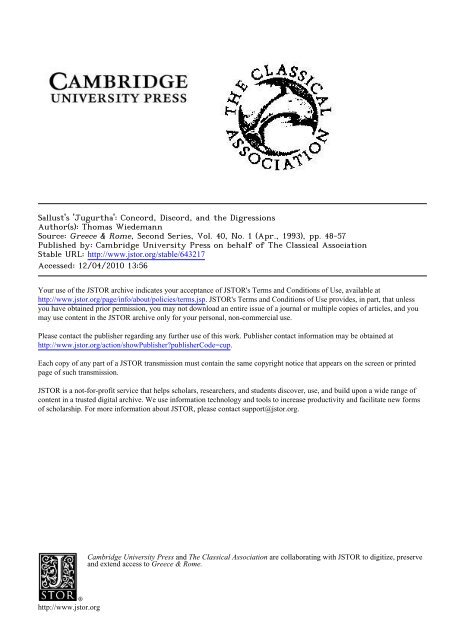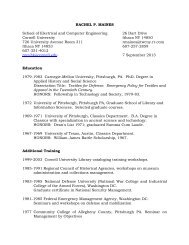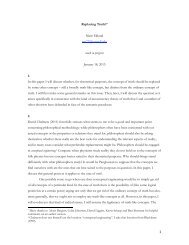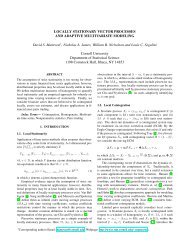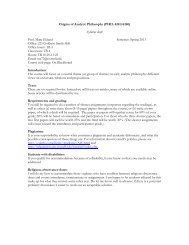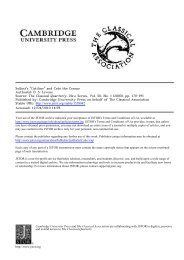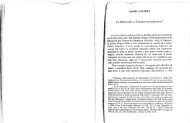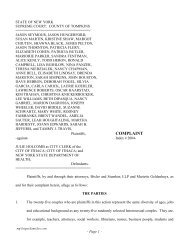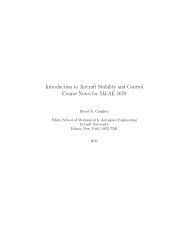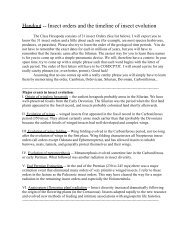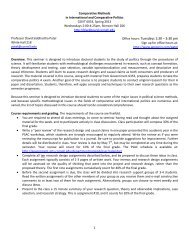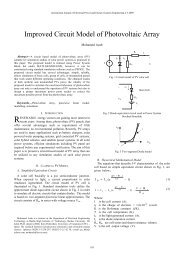Sallust's 'Jugurtha': Concord, Discord, and the Digressions
Sallust's 'Jugurtha': Concord, Discord, and the Digressions
Sallust's 'Jugurtha': Concord, Discord, and the Digressions
You also want an ePaper? Increase the reach of your titles
YUMPU automatically turns print PDFs into web optimized ePapers that Google loves.
<strong>Sallust's</strong> <strong>'Jugurtha'</strong>: <strong>Concord</strong>, <strong>Discord</strong>, <strong>and</strong> <strong>the</strong> <strong>Digressions</strong><br />
Author(s): Thomas Wiedemann<br />
Source: Greece & Rome, Second Series, Vol. 40, No. 1 (Apr., 1993), pp. 48-57<br />
Published by: Cambridge University Press on behalf of The Classical Association<br />
Stable URL: http://www.jstor.org/stable/643217<br />
Accessed: 12/04/2010 13:56<br />
Your use of <strong>the</strong> JSTOR archive indicates your acceptance of JSTOR's Terms <strong>and</strong> Conditions of Use, available at<br />
http://www.jstor.org/page/info/about/policies/terms.jsp. JSTOR's Terms <strong>and</strong> Conditions of Use provides, in part, that unless<br />
you have obtained prior permission, you may not download an entire issue of a journal or multiple copies of articles, <strong>and</strong> you<br />
may use content in <strong>the</strong> JSTOR archive only for your personal, non-commercial use.<br />
Please contact <strong>the</strong> publisher regarding any fur<strong>the</strong>r use of this work. Publisher contact information may be obtained at<br />
http://www.jstor.org/action/showPublisher?publisherCode=cup.<br />
Each copy of any part of a JSTOR transmission must contain <strong>the</strong> same copyright notice that appears on <strong>the</strong> screen or printed<br />
page of such transmission.<br />
JSTOR is a not-for-profit service that helps scholars, researchers, <strong>and</strong> students discover, use, <strong>and</strong> build upon a wide range of<br />
content in a trusted digital archive. We use information technology <strong>and</strong> tools to increase productivity <strong>and</strong> facilitate new forms<br />
of scholarship. For more information about JSTOR, please contact support@jstor.org.<br />
http://www.jstor.org<br />
Cambridge University Press <strong>and</strong> The Classical Association are collaborating with JSTOR to digitize, preserve<br />
<strong>and</strong> extend access to Greece & Rome.
Greece & Rome, Vol. xl, No. 1, April 1993<br />
SALLUST'S JUGURTHA: CONCORD, DISCORD, AND<br />
THE DIGRESSIONS<br />
By<br />
THOMAS WIEDEMANN<br />
The current fashion for emphasizing ambiguities <strong>and</strong> discontinuities in<br />
literary texts should have found <strong>Sallust's</strong> writings congenial. The Catiline<br />
explores competing <strong>and</strong> contradictory claims to virtus, exemplified by<br />
Caesar, Cato, <strong>and</strong> Catiline himself, a paragon of ambiguity in contrast to<br />
<strong>the</strong> unproblematic Cicero. The Jugurthine War is twice <strong>the</strong> length, with a<br />
more complicated structure <strong>and</strong> a wider range of material, including three<br />
formal digressions. A concern with <strong>the</strong> relationship between virtue <strong>and</strong><br />
success, <strong>and</strong> with conflict between alternative virtues, is central to this<br />
monograph too; it concludes with a victory achieved not by years of<br />
military exertion but as <strong>the</strong> result of Jugurtha's treacherous betrayal to<br />
Sulla by Bocchus in contravention of all recognized moral principles<br />
('kinship, marriage, <strong>and</strong> a formal treaty': cognationem, affinitatem,<br />
praetereafoedus intervenisse; cf. 'deceit', composito dolo, 111.2 <strong>and</strong> 4).<br />
Although <strong>the</strong> three digressions are a highly visible feature of <strong>the</strong><br />
Jugurtha, surprisingly little attention has been directed to <strong>the</strong>ir functions<br />
within <strong>the</strong> narrative. Two of <strong>the</strong>se digressions - <strong>the</strong> first <strong>and</strong> third - where<br />
<strong>the</strong>y are discussed at all in recent commentaries, continue to be thought to<br />
have little material relevance to <strong>Sallust's</strong> <strong>the</strong>me. Where explanation of<br />
<strong>the</strong>se two digressions has been attempted, as in Buchner's commentary or<br />
Scanlon's The Influence of Thucydides on Sallust, it has tended to be in<br />
stylistic terms. Histories from Herodotus onwards included digressions for<br />
a range of literary reasons - as structural devices to divide <strong>the</strong> text into<br />
distinct sections; to denote <strong>the</strong> passing of a period of time; as a way of<br />
adding variety <strong>and</strong> colour to what was ostensibly a matter-of-fact military<br />
narrative; <strong>and</strong> as a practical means to feed <strong>the</strong> reader additional material<br />
supporting <strong>the</strong> author's argument, which in a recited text (or unravelled<br />
volume) could not be done in <strong>the</strong> form of <strong>the</strong> notes or appendices that are<br />
available to writers today.1 Such explanations in primarily literary terms<br />
are attractive in view of <strong>the</strong> digressions used by <strong>Sallust's</strong> exemplar,<br />
Thucydides. Thus Thucydides begins his account of <strong>the</strong> Sicilian Expedition<br />
with a description of <strong>the</strong> isl<strong>and</strong>'s geography <strong>and</strong> ethnography (6. 1-5); he<br />
describes <strong>the</strong> origins of party strife, stasis, at Corcyra (3. 82-4); <strong>and</strong> he uses
SALLUST'S JUGURTHA: CONCORD, DISCORD, AND DIGRESSIONS 49<br />
<strong>the</strong> semi-legendary story of Harmodius <strong>and</strong> Aristogeiton to explain<br />
A<strong>the</strong>nian attitudes to tyranny (6. 53-4). These three passages clearly gave<br />
Sallust some inspiration for his own three digressions in <strong>the</strong> Jugurtha (for<br />
convenience, we may refer to <strong>the</strong>m as A, B, <strong>and</strong> C): A. The ethnography of<br />
north Africa; B. Civil discord at Rome; C. The legend of <strong>the</strong> Philaeni. Each<br />
is carefully marked off from <strong>the</strong> preceding <strong>and</strong> following text. A: 'Res<br />
postulare videtur ... ad necessitudinem rei satis dictum' (17.1-19.8: 'The<br />
subject seems to dem<strong>and</strong> ... enough has been said for what <strong>the</strong> subject<br />
requires'); B: 'ceterum mos partium et factionum ... quam ob rem ad<br />
inceptum redeo' (41.1-42.5: 'As for <strong>the</strong> tendency of division <strong>and</strong> faction...<br />
so I return to <strong>the</strong> narrative I have begun'); <strong>and</strong> C: 'Sed quoniam in eas<br />
regiones per Leptitanorum negotia venimus, non indignum videtur<br />
egregium atque mirabile facinus duorum Carthaginensium memorare ...<br />
nunc ad rem redeo' (79.1-10: 'Since <strong>the</strong> business of Leptis has taken me to<br />
that part of <strong>the</strong> world, it does not seem unworthy to relate <strong>the</strong> outst<strong>and</strong>ing<br />
<strong>and</strong> astonishing deed of two Carthaginian bro<strong>the</strong>rs ... now I return to <strong>the</strong><br />
subject').2<br />
How, if at all, does <strong>the</strong>ir subject-matter relate to <strong>Sallust's</strong> <strong>the</strong>me? The<br />
answer will depend on what we take <strong>Sallust's</strong> <strong>the</strong>me to be. 'I am going to<br />
write up <strong>the</strong> war which <strong>the</strong> Roman people waged with Jugurtha king of <strong>the</strong><br />
Numidians, (a) firstly because it was great <strong>and</strong> bloody <strong>and</strong> with victories on<br />
both sides, (b) next because that was <strong>the</strong> first occasion when <strong>the</strong> arrogance<br />
of <strong>the</strong> nobility was challenged. That struggle brought disorder to<br />
everything divine <strong>and</strong> human, <strong>and</strong> reached such a degree of madness that<br />
war <strong>and</strong> <strong>the</strong> devastation of Italy were <strong>the</strong> only limit to civil strife' (5.1).3<br />
The three commonplaces of advertising <strong>the</strong> historian's material as exciting<br />
to read because it is great, bloody, <strong>and</strong> containing many changes of fortune,<br />
follow precedent.4 <strong>Sallust's</strong> second explicit reason sounds more interesting<br />
<strong>and</strong> has been variously interpreted, depending upon whe<strong>the</strong>r scholars<br />
preferred to emphasize Sallust as a moralist opposing <strong>the</strong> vice of arrogance,<br />
or (following Mommsen) as a political pamphleteer opposed to <strong>the</strong><br />
nobilitas. The view that his purpose in writing history was primarily<br />
political presupposes a picture of Roman politics as structured around two<br />
political groupings - 'parties' as understood in <strong>the</strong> nineteenth century,<br />
ra<strong>the</strong>r than modern democratic mass parties - with Sallust supporting <strong>the</strong><br />
'popular' leader, Julius Caesar. This is not a view of Roman politics which<br />
many find acceptable today. There are also problems about <strong>the</strong> assumption<br />
that Sallust was Caesar's protege; why, in that case, was he expelled from<br />
<strong>the</strong> Senate by Appius Claudius, one of <strong>the</strong> censors of 50 B.c., without<br />
protest from <strong>the</strong> o<strong>the</strong>r censor, Lucius Piso, who was Caesar's fa<strong>the</strong>r-in-law
50 SALLUST'S JUGURTIHA: CONCORD, DISCORD, AND DIGRESSIONS<br />
<strong>and</strong> represented his interests? (There is nothing surprising about <strong>Sallust's</strong><br />
joining Caesar in 49 B.c.; like o<strong>the</strong>rs who had been excluded from political<br />
advancement, he saw that a Caesarian victory was a precondition for any<br />
fur<strong>the</strong>r role in public life.)5<br />
Whatever our view of <strong>the</strong> historical <strong>Sallust's</strong> political affiliation, <strong>the</strong><br />
passage explicitly advises <strong>the</strong> reader that <strong>the</strong> monograph he is about to read<br />
discusses <strong>the</strong> beginning of <strong>the</strong> sequence of events that led to <strong>the</strong><br />
devastation of Italy: <strong>the</strong> civil wars between Sulla <strong>and</strong> <strong>the</strong> 'Marians' in <strong>the</strong><br />
80s, but for <strong>Sallust's</strong> contemporaries perhaps more immediately those of<br />
<strong>the</strong> 40s B.C. The external <strong>and</strong> internal conflicts are tightly connected, <strong>and</strong><br />
Sallust links <strong>the</strong> two around <strong>the</strong> polarity of concord or co-operation versus<br />
discord <strong>and</strong> envy (<strong>the</strong>re are of course o<strong>the</strong>r moral issues whose consideration<br />
binds his text toge<strong>the</strong>r). That conceptual polarity is vividly brought to<br />
<strong>the</strong> fore by <strong>the</strong> deathbed advice given by Micipsa to his sons: 'small things<br />
grow as a result of concord, but <strong>the</strong> greatest things will waste away as a<br />
result of discord.'6<br />
The three digressions separate off <strong>and</strong> introduce phases of <strong>the</strong> war under<br />
various Roman comm<strong>and</strong>ers who represent different ethical states. A: <strong>the</strong><br />
catastrophic Roman failures under <strong>the</strong> comm<strong>and</strong> of <strong>the</strong> nobles Bestia <strong>and</strong><br />
Albinus, who notwithst<strong>and</strong>ing <strong>the</strong>ir hereditary claim to virtus suffer from<br />
<strong>the</strong> vices of avaritia <strong>and</strong> imperitia. B: <strong>the</strong> second phase, in which <strong>the</strong><br />
aristocratic general Metellus is indeed competent, but fails to make <strong>the</strong> best<br />
use of his subordinate Marius because of his arrogance. Finally C, <strong>the</strong> last<br />
phase of <strong>the</strong> war, in which Marius is successful, but not on his own. The<br />
final surrender of Jugurtha to <strong>the</strong> Romans by <strong>the</strong> Mauretanian king<br />
Bocchus is brought about by Marius' quaestor Sulla, to whom Sallust<br />
devotes a detailed <strong>and</strong> ambiguously positive character-sketch (ch. 95). The<br />
reader cannot ignore <strong>the</strong> moral: <strong>the</strong> best noble comm<strong>and</strong>er cannot succeed<br />
if he ignores <strong>the</strong> talent of a novus homo; but a talented novus homo can only<br />
succeed in co-operation with a talented aristocrat. Marius <strong>and</strong> Sulla<br />
toge<strong>the</strong>r brought success for Roman arms against <strong>the</strong> external threat;<br />
contrast <strong>the</strong> 'bellum atque vastitas Italiae' later brought about by <strong>the</strong>ir<br />
discord, which 'I am not sure whe<strong>the</strong>r I would be more ashamed or more<br />
disgusted to narrate' (incertum habeopudeat anpigeat magis disserere, 95.4).<br />
<strong>Sallust's</strong> o<strong>the</strong>r <strong>the</strong>mes are secondary to this emphasis on co-operation.<br />
He has subordinated his selection of narrative material to this moral <strong>the</strong>me<br />
to <strong>the</strong> extent that geographical or chronological precision, as commentators<br />
constantly remind us, are of little interest to him. Thus he fails to<br />
make explicit reference to <strong>the</strong> winters that separated <strong>the</strong> campaigning<br />
seasons of 108, 107, <strong>and</strong> 106 B.C. (Syme, Sallust, p. 145; Paul, p. 198;
SALLUST'S JUGURTHA: CONCORD, DISCORD, AND DIGRESSIONS 51<br />
Watkiss, p. 27). The break in <strong>Sallust's</strong> narrative represented by digression<br />
C probably corresponds to <strong>the</strong> first of <strong>the</strong>se winters, but that only shows<br />
that <strong>Sallust's</strong> objective was not to record a sequence of campaigns, but to<br />
structure his text in terms of an account of political virtues <strong>and</strong> vices. The<br />
same applies to digression A: one of its functions may well be to cover a<br />
period of perhaps four years between Rome's division of Numidia <strong>and</strong><br />
Jugurtha's seizure of Adherbal's portion, but that is not something Sallust<br />
chooses to tell us: ra<strong>the</strong>r, he wants to signal that he is about to begin his<br />
account of <strong>the</strong> events leading to direct military intervention. The three<br />
digressions separate phases of <strong>the</strong> war which illustrate different moralities,<br />
associated with a series of Roman comm<strong>and</strong>ers, who are not only<br />
contrasted with one ano<strong>the</strong>r, but also with <strong>the</strong> enemies <strong>the</strong>y are fighting<br />
against.<br />
Of <strong>the</strong> three digressions, B (on partes, political divisions) is <strong>the</strong> one whose<br />
<strong>the</strong>matic relevance to <strong>the</strong> narrative is <strong>the</strong> easiest to identify: it gives <strong>the</strong><br />
reader <strong>the</strong> background to popular hostility to <strong>the</strong> 'nobles' <strong>and</strong> to <strong>the</strong><br />
Mamilian rogation. The Gracchi are treated as a separate <strong>and</strong> discrete<br />
<strong>the</strong>me, justifying <strong>Sallust's</strong> at first sight curious assertion in ch. 5.1 that<br />
Rome's political divisions began only at <strong>the</strong> time of <strong>the</strong> Jugurthan war.<br />
These chapters were composed at a time when <strong>the</strong> experience of civil war<br />
<strong>and</strong> of <strong>the</strong> triumviral proscriptions was still fresh; it is not illegitimate to<br />
assume that Sallust wished his readers to underst<strong>and</strong> <strong>the</strong>m with reference<br />
to <strong>the</strong> actions <strong>and</strong> claims of contemporary political leaders. The emphasis<br />
on civil discord is reinforced by <strong>the</strong> stylistic parallels with <strong>the</strong> analysis of<br />
stasis given by Thucydides on <strong>the</strong> occasion of one of <strong>the</strong> first major<br />
outbreaks of civil strife recorded in that narrative, at Corcyra in 3. 79-81.7<br />
<strong>Sallust's</strong> account associates o<strong>the</strong>r vices with civil dissension (41.10). It is<br />
preceded by a sentence describing <strong>the</strong> court of enquiry set up by <strong>the</strong><br />
Mamilian rogation, 'conducted harshly <strong>and</strong> violently, on <strong>the</strong> basis of<br />
uncorroborated rumours <strong>and</strong> in accordance with <strong>the</strong> caprice of <strong>the</strong><br />
people: at that time, with things going <strong>the</strong>ir way, <strong>the</strong> people exercised<br />
total lack of restraint, just as <strong>the</strong> nobility had so often done' ('exercita<br />
aspere violenterque ex rumore et lubidine plebis: ut saepe nobilitatem, sic<br />
ea tempestate plebem ex secundis rebus insolentia ceperat'). Lubido,<br />
capriciousness, is picked up again in <strong>the</strong> digression, first applied to <strong>the</strong><br />
people (41.5), <strong>and</strong> <strong>the</strong>n to <strong>the</strong> nobilitas (42.4). To read this digression as a<br />
political attack on <strong>the</strong> 'nobility' would be naive: on <strong>the</strong> contrary, Sallust<br />
explicitly describes <strong>the</strong> Gracchi as <strong>the</strong>mselves 'noble' ('<strong>the</strong> first nobles to<br />
prefer true glory to <strong>the</strong> unjust exercise of power', 'primi ex nobilitate ...<br />
qui veram gloriam iniustae potentiae anteponerent': 41.10). If <strong>the</strong> account
52 SALLUST'S JUGURTHA: CONCORD, DISCORD, AND DIGRESSIONS<br />
of civil conflict has a programme, it is to analyse rival claims to political<br />
virtus.<br />
Political co-operation <strong>and</strong> discord are also <strong>the</strong> <strong>the</strong>me of <strong>the</strong> first<br />
digression, whose timbre is at first sight very different. Sallust wants it to<br />
look like <strong>the</strong> ethnographical digressions in which Hellenistic historians<br />
displayed <strong>the</strong>ir erudition, in competition with <strong>the</strong>ir predecessors.8 He<br />
makes no claim to have learnt anything about Numidia through autopsy<br />
(<strong>the</strong>re is no reference to his having governed <strong>the</strong> territory, although <strong>the</strong><br />
description of <strong>the</strong> Numidian huts at 18.8 looks like autopsy: see<br />
Koestermann, ad loc.); instead, he claims to have read King Hiempsal's<br />
description, written in Punic, in a specially prepared translation. Notwithst<strong>and</strong>ing<br />
such a recondite (<strong>and</strong>, to his Italian readers, inaccessible)<br />
literary source, Sallust disclaims all responsibility for <strong>the</strong> truth-value of its<br />
contents (as Herodotus sometimes does). Hiempsal's myth explaining <strong>the</strong><br />
origins of <strong>the</strong> peoples of North Africa in terms of <strong>the</strong> Median, Persian, <strong>and</strong><br />
Armenian components of <strong>the</strong> army that accompanied Hercules on his<br />
expedition to <strong>the</strong> far west tells <strong>the</strong> reader nothing about <strong>the</strong> political<br />
structure of second-century B.C. Numidia, or of <strong>the</strong> background to its<br />
relationship with Rome, outlined in a few sentences (ch. 19.7). Its relevance<br />
to <strong>Sallust's</strong> narrative lies elsewhere: it is a statement about <strong>the</strong> difference<br />
between a well-ordered state, <strong>and</strong> <strong>the</strong> anarchy of division. Hercules is to be<br />
understood as <strong>the</strong> symbol of civil society; it was as a founder of cities that<br />
he was known in <strong>the</strong> western Mediterranean.9 Hercules' death results in <strong>the</strong><br />
division <strong>and</strong> dispersal of his army. For <strong>the</strong> Persian contingent, civil life is<br />
ab<strong>and</strong>oned, <strong>and</strong> civilized norms are transgressed: ships are turned upside<br />
down to make huts, commerce (with Spain) becomes impossible because<br />
<strong>the</strong>re is no common language, <strong>and</strong> <strong>the</strong>y end up as nomads like <strong>the</strong><br />
autochthonous Gaetulians (18.3-8). City life developed sooner among <strong>the</strong><br />
Medians <strong>and</strong> Armenians because <strong>the</strong>ir proximity to Spain facilitated<br />
commerce (an argument reminiscent of Thucydides in his Archaeology),<br />
but it was not that particular ethnic element that established control over<br />
North Africa: it was <strong>the</strong> more warlike <strong>and</strong> nomadic ex-Persians, now calling<br />
<strong>the</strong>mselves Numidians. Sallust has chosen to report Hiempsal's myth<br />
because of <strong>the</strong> moral point it makes. It explains <strong>the</strong> discord endemic in<br />
North Africa. It also glosses <strong>the</strong> division of Numidia in <strong>the</strong> immediately<br />
preceding chapter (16.5), with Adherbal's portion 'having more harbours<br />
<strong>and</strong> fine buildings' corresponding to that originally inhabited by Libyans,<br />
<strong>and</strong> Jugurtha's 'richer in fields <strong>and</strong> population' to <strong>the</strong> Gaetulian part. The<br />
phrase in divisione with which that sentence begins is picked up by <strong>the</strong> first<br />
words of <strong>Sallust's</strong> account of <strong>the</strong> controversy amongst geographers as to
SALLUST'S JUGURTHA: CONCORD, DISCORD, AND DIGRESSIONS 53<br />
whe<strong>the</strong>r Africa is a separate entity or not: In divisione orbis terrae... (17.3:<br />
'in dividing up <strong>the</strong> globe'). 'Africa' entails disagreement.<br />
Throughout <strong>the</strong> monograph, <strong>Sallust's</strong> account of <strong>the</strong> actions of Rome's<br />
African enemies emphasizes division <strong>and</strong> disorder. This is particularly<br />
true of <strong>the</strong> final phase of <strong>the</strong> war. 'When <strong>the</strong> kings learnt about Marius'<br />
arrival, <strong>the</strong>y went <strong>the</strong>ir separate ways to inaccessible places'; Sallust<br />
comments that Jugurtha hoped that he could similarly divide <strong>the</strong> Roman<br />
forces (ch. 87.4). Even when Jugurtha's <strong>and</strong> Bocchus' armies combine to<br />
attack <strong>the</strong> Romans, <strong>the</strong>re is no organization - 'not in line or in any<br />
normal battle formation, but in gangs just as chance grouped <strong>the</strong>m<br />
toge<strong>the</strong>r' (97.4). The emphasis on <strong>the</strong> role of chance, confusion, <strong>and</strong><br />
indiscipline in explaining <strong>the</strong> outcome of particular incidents in warfare is<br />
of course Thucydidean in origin. But for Sallust indiscipline <strong>and</strong> division<br />
are moral weaknesses, instances of man's failure to rise above <strong>the</strong> level of<br />
<strong>the</strong> beasts, ei<strong>the</strong>r at <strong>the</strong> individual or at <strong>the</strong> social level. In classical<br />
literature, one typical marker of <strong>the</strong> point where men are almost animals<br />
is <strong>the</strong> nomad.10 Having destroyed his own supporters, <strong>and</strong> beginning to<br />
realize that he cannot win <strong>the</strong> war, Jugurtha declines to <strong>the</strong> level of a<br />
nomad: he is 'doubtful <strong>and</strong> uncertain', varius incertusque; 'He changed his<br />
itineraries <strong>and</strong> his comm<strong>and</strong>ers from day to day; sometimes he moved<br />
against <strong>the</strong> enemy, sometimes into <strong>the</strong> desert' (74.1); 'After that he never<br />
stayed in one place for more than one day or one night' (76.1), repeating<br />
'contrary to royal dignity, he often rested in a different place each night,<br />
<strong>and</strong> sometimes he would wake from his sleep, grab his weapons <strong>and</strong> make<br />
a disturbance' (72.2). As in o<strong>the</strong>r character sketches - most strikingly that<br />
of Catiline - internal <strong>and</strong> external instability go h<strong>and</strong> in h<strong>and</strong>. They are<br />
inimical to civil society, but characteristic of despots, such as Bocchus:<br />
'Royal wishes are generally as fickle as <strong>the</strong>y are emphatic, <strong>and</strong> often<br />
contradict <strong>the</strong>mselves' ('plerumque regiae voluntates ut vehementes sic<br />
mobiles, saepe ipsae sibi advorsae': 113.1). Bocchus' mobilitas ingeni,<br />
constant changes of plan, <strong>and</strong> treachery (explicitly called Punica fides:<br />
108.3; cf. 88.6, 102.15) are repeatedly emphasized. To <strong>the</strong> very last<br />
moment, Bocchus is divided within himself as to whe<strong>the</strong>r to betray<br />
Jugurtha to Sulla or vice versa. 'During <strong>the</strong> night which preceded <strong>the</strong> day<br />
set for <strong>the</strong> conference, <strong>the</strong> Moor first summoned his friends, <strong>the</strong>n<br />
changed his mind <strong>and</strong> sent everyone else away, <strong>and</strong> is said to have had a<br />
great struggle with himself, changing <strong>the</strong> expression of his face <strong>and</strong> eyes<br />
as he kept changing his mind; although he said nothing, <strong>the</strong>y betrayed<br />
what was hidden in his heart' (113.3.).<br />
But it is not just among Africans that civilized behaviour is liable to
54 SALLUST'S JUGURTHA: CONCORD, DISCORD, AND DIGRESSIONS<br />
break down, to revert to unstable nomadism. The autochthonous<br />
Gaetulians <strong>and</strong> Libyans had lived like beasts, '<strong>the</strong>y were ruled by no<br />
customs or law or anyone's authority' (18.2). Rome too is threatened by<br />
that absence of law, so Memmius claims at <strong>the</strong> beginning of his speech<br />
attacking <strong>the</strong> domination of <strong>the</strong> aristocracy (no justice, 31.1; not law but<br />
caprice, 31.7). Particularly striking is <strong>the</strong> account of indiscipline in <strong>the</strong><br />
Roman army in Africa. Just as <strong>the</strong> pre-Herculean Gaetulians are described<br />
in epic terms as restless <strong>and</strong> roaming about (vagi palantes, 18.2: cf.<br />
Koestermann, ad loc.), so <strong>the</strong> Romans had ab<strong>and</strong>oned discipline: '<strong>the</strong>y<br />
roamed about restlessly, wasting <strong>the</strong> fields' (vagabantur et palantes agros<br />
vastare, 44.5). <strong>Sallust's</strong> description of <strong>the</strong> state in which Metellus found his<br />
army consciously uses phrases reminding <strong>the</strong> reader of chapter 18, but<br />
<strong>the</strong>re are interesting differences: <strong>the</strong> nomads move from place to place to<br />
find fresh l<strong>and</strong>, agros temptantes, but <strong>the</strong> Roman army moves camp only<br />
when forced to by stench or lack of fodder; while <strong>the</strong> Persians <strong>and</strong> Medes<br />
respectively find it difficult to buy or barter things with <strong>the</strong> people of Spain<br />
(ab Hispanis emundi aut mut<strong>and</strong>i copia) <strong>and</strong> barter amongst <strong>the</strong>mselves<br />
(mutare res inter se instituerant, 18.5 <strong>and</strong> 9), <strong>the</strong> Roman soldiers barter <strong>the</strong>ir<br />
illicit war booty with traders for imported wine (mutare cum mercatoribus<br />
vino advecticio). Spurius Albinus' absence <strong>and</strong> his bro<strong>the</strong>r's incompetence<br />
had allowed <strong>the</strong> Roman army in Africa to sink to <strong>the</strong> level reminscent of<br />
Hercules' army after it had lost its leader.<br />
The virtus of <strong>the</strong> bro<strong>the</strong>rs Albinus lay solely in <strong>the</strong>ir birth, <strong>and</strong> Spurius'<br />
support for his bro<strong>the</strong>r by entrusting him with comm<strong>and</strong> of <strong>the</strong> army in his<br />
absence brought disaster on <strong>the</strong> Romans; indeed <strong>the</strong>y cannot really be<br />
described as co-operating, since Aulus acts in Spurius' absence (<strong>and</strong> seeks<br />
to win <strong>the</strong> glory of ending <strong>the</strong> war in competition with him), <strong>and</strong> Spurius<br />
refuses to recognize his bro<strong>the</strong>r's treaty (ch. 37-9). Their failure as<br />
bro<strong>the</strong>rs is highlighted by <strong>the</strong> very peculiar <strong>the</strong>me of <strong>Sallust's</strong> third<br />
digression. It is carefully prepared by a statement about an appeal of Lepcis<br />
to Metellus (selected for no o<strong>the</strong>r reason than to give Sallust an excuse for<br />
introducing <strong>the</strong> story). 'Since <strong>the</strong> affairs of <strong>the</strong> people of Lepcis have<br />
brought us to this region, it seems fitting to relate <strong>the</strong> noble <strong>and</strong> memorable<br />
act of two Carthaginians' (79.1). Egregium atque mirabile facinus, as <strong>the</strong><br />
historian's material is typically supposed to be; though <strong>the</strong> reader is taken<br />
aback to find a Roman historian selecting Carthaginians as exemplars of a<br />
noble deed. In fact nei<strong>the</strong>r Lepcis nor its would-be tyrant Hamilcar are of<br />
significance to <strong>the</strong> progress of <strong>the</strong> war, <strong>and</strong> Sallust does not bo<strong>the</strong>r to<br />
mention ei<strong>the</strong>r of <strong>the</strong>m again. It is <strong>the</strong> ethical import of <strong>the</strong> story of <strong>the</strong><br />
Philaeni that interests Sallust. Biichner suggested that Sallust intended it to
SALLUST'S JUGURTIHA: CONCORD, DISCORD, AND DIGRESSIONS 55<br />
reinforce <strong>the</strong> reader's appreciation of <strong>the</strong> virtus of Metellus (<strong>and</strong> perhaps<br />
also of Marius), as though virtus were unproblematic. But <strong>the</strong> qualities<br />
shown by <strong>the</strong> Philaeni are more complex than athletic energy <strong>and</strong> a<br />
willingness to be buried alive for <strong>the</strong>ir country. The fact that <strong>the</strong><br />
protagonists are bro<strong>the</strong>rs is an essential element of <strong>the</strong> story. To run a race,<br />
only one competitor is needed to represent each city. The fact that <strong>the</strong>y are<br />
pairs of bro<strong>the</strong>rs places <strong>the</strong> story in a line of similar tales illustrating<br />
anxieties about <strong>the</strong> potential for rivalry between bro<strong>the</strong>rs. Fraternal co-<br />
operation came to represent <strong>the</strong> highest moral virtue. An example -<br />
perhaps one which triggered <strong>Sallust's</strong> story - was Solon's account of<br />
Cleobis <strong>and</strong> Biton (Herodotus 1. 31).11<br />
'Who can be more of a friend than one bro<strong>the</strong>r to ano<strong>the</strong>r' asks Micipsa<br />
in his deathbed speech, <strong>and</strong> immediately continues with <strong>the</strong> warning: '<strong>and</strong><br />
what outsider would you be able to trust if you became an enemy of your<br />
own people?' (10.5). Bro<strong>the</strong>rs represent conflict more frequently than<br />
mutual support. That conflict may lead to fratricide, as in <strong>the</strong> story of<br />
Eteocles <strong>and</strong> Polynices. Twins, as <strong>the</strong> closest type of fraternal relationship,<br />
may symbolize <strong>the</strong> danger most sharply: Acrisius <strong>and</strong> Proetius quarrelled<br />
while still in <strong>the</strong> womb, <strong>and</strong> resolved <strong>the</strong>ir quarrel by fighting when <strong>the</strong>y<br />
grew up (thus becoming <strong>the</strong> inventors of <strong>the</strong> shield: Apollodorus, ed.<br />
Frazer, Loeb vol. I p. 145 n. 4). For Romans, <strong>the</strong> story of <strong>the</strong> quarrel<br />
between Romulus <strong>and</strong> Remus was a central part of <strong>the</strong> myth of <strong>the</strong>ir city's<br />
foundation, providing an explanation for civil discord until eventually <strong>the</strong><br />
Christian patrons Peter <strong>and</strong> Paul replaced Romulus <strong>and</strong> Remus. Such<br />
anxieties are not limited to Greece <strong>and</strong> Rome, as <strong>the</strong> story of Jacob <strong>and</strong><br />
Esau shows (Genesis 25. 21 ff.), nor to societies whose rules of inheritance<br />
gave bro<strong>the</strong>rs (<strong>and</strong> at Rome sisters) equal <strong>and</strong> rival claims to inherit <strong>the</strong>ir<br />
fa<strong>the</strong>r's property. Shakespeare's Lear shows that even when, from <strong>the</strong><br />
tenth century on, north-western Europeans developed <strong>the</strong> system of<br />
primogeniture as a means to regulate precedence <strong>and</strong> inheritance between<br />
siblings, <strong>the</strong> <strong>the</strong>me lost little if any of its mythical power.<br />
What <strong>the</strong>n are <strong>the</strong> parallels Sallust wishes to draw between <strong>the</strong> tale of <strong>the</strong><br />
Philaeni <strong>and</strong> <strong>the</strong> third phase of <strong>the</strong> war? Metellus, learning of Marius'<br />
appointment, feels insulted, fails to pursue his military advantage, <strong>and</strong> final<br />
success eludes him. Even before that, Metellus' <strong>and</strong> Marius' co-operation is<br />
only at surface level: when <strong>the</strong>y campaign toge<strong>the</strong>r, <strong>the</strong>y act in different<br />
places - divorsi agebant, 55.6. In contrast <strong>the</strong> Philaeni, when sl<strong>and</strong>ered as<br />
not having set off on <strong>the</strong> prescribed day, accept <strong>the</strong> challenge <strong>and</strong> sacrifice<br />
<strong>the</strong>ir lives for <strong>the</strong>ir country. Their co-operation with <strong>the</strong>ir country is<br />
symbolized by <strong>the</strong>ir mutual solidarity: <strong>the</strong> Romans, too, will achieve <strong>the</strong>ir
56 SALLUST'S JUGURTHA: CONCORD, DISCORD, AND DIGRESSIONS<br />
aims, but only if <strong>the</strong> two partes - represented by Marius <strong>and</strong> Sulla - co-<br />
operate.<br />
It is not only <strong>the</strong> two Roman pairs Metellus/Marius <strong>and</strong> Marius/Sulla<br />
who exemplify <strong>the</strong> problems of co-operation. There is also <strong>the</strong> relationship<br />
between Jugurtha <strong>and</strong> his courtier Bomilcar, <strong>and</strong> between Jugurtha <strong>and</strong> his<br />
fellow king Bocchus. In chapters 61 <strong>and</strong> 62, Sallust describes how Metellus<br />
planned to entrap Jugurtha by suborning Bomilcar to persuade him to<br />
surrender unconditionally. Jugurtha initially agrees, but <strong>the</strong>n changes his<br />
mind, <strong>and</strong> <strong>the</strong> war continues. Immediately after this comes <strong>Sallust's</strong><br />
account of Marius' request for leave to bid for <strong>the</strong> consulship: just as<br />
Bomilcar treacherously <strong>and</strong> unsuccessfully tries to persuade Jugurtha to<br />
surrender, so Metellus disloyally <strong>and</strong> unsuccessfully tries to persuade<br />
Marius to put off his bid for <strong>the</strong> consulship. Sallust is scathing in his<br />
account of <strong>the</strong> behaviour of both Romans: 'he had a contemptuous <strong>and</strong><br />
proud spirit, that common vice of <strong>the</strong> nobility' (64.1); 'he behaved with<br />
ambition <strong>and</strong> with anger, <strong>the</strong> worst of advisors... he talked both accusingly<br />
<strong>and</strong> boastfully about <strong>the</strong> progress of <strong>the</strong> war' (64.4f.). The episode of<br />
Bomilcar's treachery against Jugurtha is concluded a few pages later, <strong>and</strong><br />
he is executed; in <strong>the</strong> following chapter, <strong>the</strong> episode of Metellus' lack of<br />
support for Marius is concluded when Metellus sends him home (domum<br />
dimittit), to st<strong>and</strong> for <strong>the</strong> consulship (chs. 72 <strong>and</strong> 73).<br />
We may conclude that <strong>the</strong> material of <strong>the</strong> three digressions is far from<br />
irrelevant to <strong>the</strong> <strong>the</strong>me of <strong>Sallust's</strong> history. As Sir Ronald Syme put it, 'The<br />
digressions are often a clue to <strong>the</strong> writer's closest preoccupations'. In a text<br />
which questions different 'virtues' <strong>and</strong> explores <strong>the</strong> conflicts between<br />
<strong>the</strong>m, <strong>the</strong> consistently positive emphasis on concordia may surprise; but<br />
both aspects are entirely consistent with <strong>the</strong> historical experience of<br />
Italians in <strong>the</strong> 40s B.C.<br />
NOTES<br />
1. T. F. Scanlon, The Influence of Thucydides on Sallust (Heidelberg, 1980), pp. 175; 126-37; K.<br />
Buchner, DerAufbau von Sallusts BellumJugurthinum (1956), p. 15 emphasizes <strong>the</strong> structural role ('die<br />
gliedernde Funktion') of <strong>the</strong> first digression. G. Al. Paul, A Historical Commentary on <strong>Sallust's</strong> Bellum<br />
Jugurthinum (Liverpool, 1984), has little specific to say on <strong>the</strong> literary functions of <strong>the</strong> digressions:<br />
p. 72 (A), p. 198 (C). L. Watkiss's student edition leaves <strong>the</strong> third digression out of his analysis completely:<br />
p. 19.<br />
2. The four introductory chapters also display elements typical of a digression, ending with <strong>the</strong><br />
st<strong>and</strong>ard digressory formula 'nunc ad rem redeo': see T. E.J. Wiedemann, LCM 4 (1979), 13-16 <strong>and</strong><br />
LCM 5.7 July 1980), 147-9. They introduce a discrete section (chs. 5-16) containing material about<br />
<strong>the</strong> background to <strong>the</strong> war analogous to that given by Thucydides in his first book.<br />
3. 'Bellum scripturus sum quod populus Romanus cum Iugurtha rege Numidarum gessit, primum
SALLUST'S JUGURTHA: CONCORD, DISCORD, AND DIGRESSIONS 57<br />
quia magnum et atrox variaque victoria fuit, dehinc quia tunc primum superbiae nobilitatis obviam<br />
itum est. Quae contentio divina et humana cuncta permiscuit eoque vecordiae processit, ut studiis<br />
civilibus bellum atque vastitas Italiae finem faceret.'<br />
4. On <strong>the</strong> epic greatness of <strong>the</strong> war about to be narrated, cf., e.g., Herodotus 1. 1, Thucydides 1.<br />
23.1, Polybius 1. 13.11, Livy 21. 1.12 etc., <strong>and</strong> for verse writers, e.g., Vergil Aeneid 7. 44 f.: 'maius opus<br />
moveo.' We may also note that <strong>Sallust's</strong> account of <strong>the</strong> military operations of <strong>the</strong> final phase of <strong>the</strong> war,<br />
under Marius' comm<strong>and</strong>, is introduced by <strong>the</strong> phrase 'it seemed [to Marius] that it was time to under-<br />
take greater <strong>and</strong> more difficult things': 89.3.<br />
5. Piso 'belonged to Caesar' <strong>and</strong> intervened to prevent <strong>the</strong> removal from <strong>the</strong> senate of Caesar's<br />
supporter Curio: Cassius Dio 40. 63.3. For Caesar's reinstatement of those demoted by <strong>the</strong> censors, cf.<br />
Suetonius, Divus Julius 41.1. On <strong>the</strong> historical Sallust, see J. Malitz, Ambitio Mala (Bonn, 1975).<br />
6. '<strong>Concord</strong>ia parvae res crescunt, discordia maxumae dilabuntur': 10.6. The importance of<br />
concord as a political slogan in <strong>the</strong> Ciceronian period was discussed by Hermann Strasburger in his<br />
1931 doctoral <strong>the</strong>sis (Studien zurAlien Geschichle I [Hildesheim, 1982], 1 ff.).<br />
7. Scanlon, pp. 131 ff.<br />
8. Syme, Sallust (Oxford, 1964), p. 152: 'Greek erudition <strong>and</strong> fancies.'<br />
9. G. Karl Galinsky, The Herakles Theme (Oxford, 1972). At A<strong>the</strong>ns, it was Theseus who became<br />
<strong>the</strong> founding hero of <strong>the</strong> 'city' <strong>and</strong> of political life: hence Theseus is associated with Herakles in some of<br />
his adventures, <strong>and</strong> takes over some of his attributes.<br />
10. Wiedemann, 'Between men <strong>and</strong> beasts', in I. S. Moxon, J. D. Smart, <strong>and</strong> A.J. Woodman (edd.),<br />
Past Perspectives (Cambridge, 1986), pp. 189ff.<br />
11. Similar tales of races run to establish boundaries between cities may involve several runners, but<br />
not bro<strong>the</strong>rs. In <strong>the</strong> race between Clazomenae <strong>and</strong> Cyme, <strong>the</strong> plurality of runners is explained by <strong>the</strong><br />
requirement to offer a sacrifice at <strong>the</strong> boundary: Diodorus 15. 1.<br />
NEW SURVEYS IN THE CLASSICS<br />
The editors regret that no New Survey in <strong>the</strong> Classics can be issued with<br />
this year's volume of Greece & Rome.


